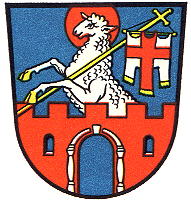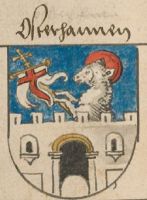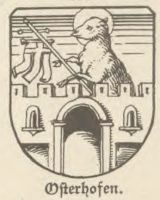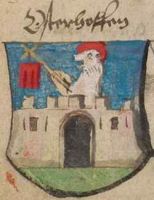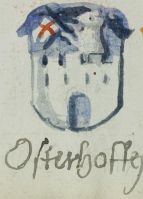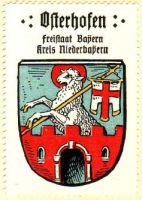Osterhofen: Difference between revisions
Knorrepoes (talk | contribs) m (Text replacement - "|center|Wappen von {{PAGENAME}}]] " to "|center|alt=Wappen von {{PAGENAME}} / Arms of {{PAGENAME}}]] ") |
Knorrepoes (talk | contribs) No edit summary |
||
| Line 13: | Line 13: | ||
|- | |- | ||
|'''German''' | |'''German''' | ||
| | | In Blau über roter Zinnenmauer mit offenem Tor ein wachsendes, rot nimbiertes, golden bewehrtes silbernes Gotteslamm, das die Osterfahne an goldenem Kreuzstab trägt. | ||
In Blau über roter Zinnenmauer mit offenem Tor ein wachsendes, rot nimbiertes, golden bewehrtes silbernes Gotteslamm, das die Osterfahne an goldenem Kreuzstab trägt. | |||
|- | |- | ||
|'''English''' | |'''English''' | ||
| Line 23: | Line 22: | ||
The oldest seal of the city is known from 1423, but dates from the late 14<sup>th</sup> century. The seal showed an unclear figure, which has been interpreted as a beehive or a large bell. All seals after 1428 (when the city became a possession of the Dukes of Bayern), show the Paschal Lamb (a canting symbol, from Osterlamm) above a city wall. The composition as such did not change (except for a green base in some images), but the size and shape of the different elements has varied widely during the centuries. | The oldest seal of the city is known from 1423, but dates from the late 14<sup>th</sup> century. The seal showed an unclear figure, which has been interpreted as a beehive or a large bell. All seals after 1428 (when the city became a possession of the Dukes of Bayern), show the Paschal Lamb (a canting symbol, from Osterlamm) above a city wall. The composition as such did not change (except for a green base in some images), but the size and shape of the different elements has varied widely during the centuries. | ||
<gallery widths=250px heights=200px perrow=0> | |||
File:Osterhofen1530.jpg|alt=Wappen von Osterhofen / Arms of Osterhofen|The arms in a manuscript +/- 1530 | |||
| | File:Osterhofen1880.jpg|alt=Wappen von Osterhofen / Arms of Osterhofen|The arms by Apian (1559) | ||
File:Osterhofen1599.jpg|alt=Wappen von Osterhofen / Arms of Osterhofen|The arms in a [https://dl.wdl.org/8930/service/8930.pdf manuscript from 1599] | |||
File:Osterhofen16.jpg|alt=Wappen von Osterhofen / Arms of Osterhofen|The arms in a [[:Category:Windhag city arms|16th century manuscript]] | |||
File:osterhofen.hagd.jpg|alt=Wappen von Osterhofen / Arms of Osterhofen|The arms by [[Otto Hupp|Hupp]] in the [[Kaffee Hag albums]] +/- 1925 | |||
</gallery> | |||
{{media}} | {{media}} | ||
Revision as of 07:28, 25 August 2022
This page is part of the German heraldry portal |
Heraldry of the World |
|
German heraldry:
|
Selected collector's items from Germany:
|
OSTERHOFEN
State : Bayern
District (Kreis) : Deggendorf (until 1973 Vilshofen)
Additions : 1972 Altenmarkt, Anning, Galgweis (1964 Oberndorf), Gergweis, Göttersdorf, Kirchdorf bei Osterhofen, Langenamming, Niedermünchsdorf, Wisselsing; 1978 Aicha an der Donau
| German | In Blau über roter Zinnenmauer mit offenem Tor ein wachsendes, rot nimbiertes, golden bewehrtes silbernes Gotteslamm, das die Osterfahne an goldenem Kreuzstab trägt. |
| English | No blazon/translation known. Please click here to send your (heraldic !) blazon or translation |
Origin/meaning
The oldest seal of the city is known from 1423, but dates from the late 14th century. The seal showed an unclear figure, which has been interpreted as a beehive or a large bell. All seals after 1428 (when the city became a possession of the Dukes of Bayern), show the Paschal Lamb (a canting symbol, from Osterlamm) above a city wall. The composition as such did not change (except for a green base in some images), but the size and shape of the different elements has varied widely during the centuries.
The arms in a manuscript from 1599
The arms in a 16th century manuscript
The arms by Hupp in the Kaffee Hag albums +/- 1925
Contact and Support
Partners:
Your logo here ?
Contact us
© since 1995, Heraldry of the World, Ralf Hartemink 
Index of the site
Literature : Stadler, 1964-1971, 8 volumes.


